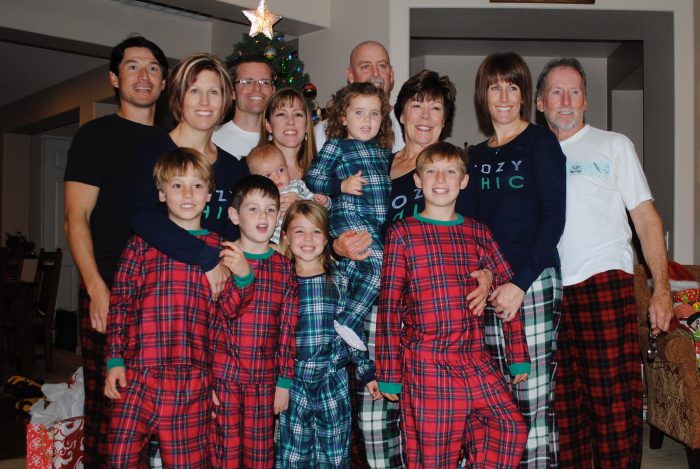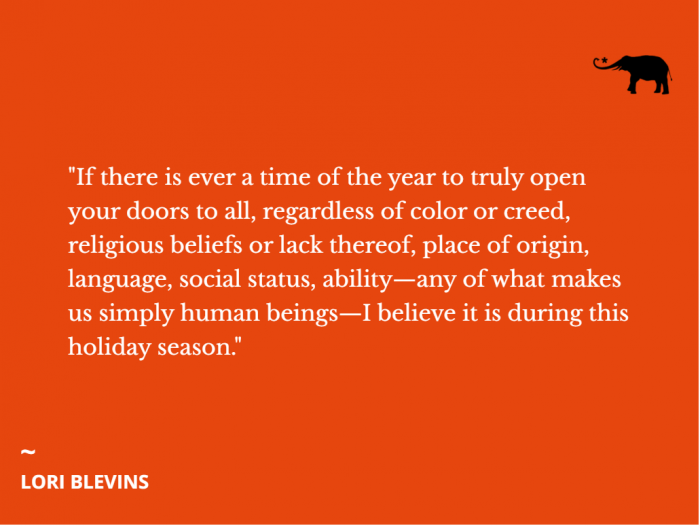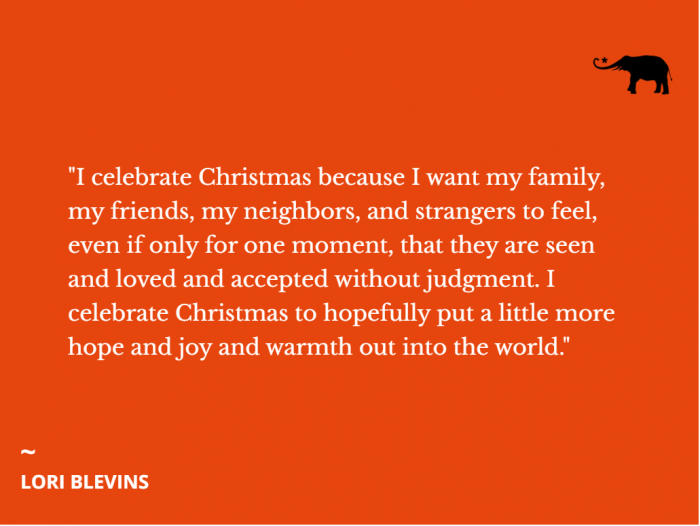I do not believe in God.
I did, for a minute, in my youth. But that phase passed quickly, for a variety of reasons.
Yet, I celebrate Christmas. I have every year for the 49 years of my life. To many, this seems wholly contradictory. But is it really?
In 2018, according to the Pew Research Center, approximately 10 percent of the United States population did not believe in any higher power or spiritual force. Yet, 81 percent of non-Christians report celebrating Christmas. So, while I may be in the minority of nonbelievers, I am far from alone in celebrating this holiday and time of year as a nonbeliever.
While I do not believe in any God, what I do strongly believe in is the reasons behind why my family and I celebrate Christmas. And, what I believe is the true intention of Christmas. I say Merry Christmas when appropriate and welcomed. I also say Happy Holidays and Seasons Greetings. I respect those who celebrate Christmas just as much as those who celebrate Hanukkah, Kwanza, or nothing at all.
My earliest Christmas memory is coming into the living room and seeing my giant, pink Barbie Dream House, and my dad’s smiling face. We had stockings, left milk and cookies for Santa, decorated a tree, and put lights on the house. We had Christmas parades through our neighborhood, complete with our neighbor Billy dressed as Santa Claus and me and my best friend Cheryl dressed in what could only be called Christmas cheerleader outfits (made by my mom) marching down the street, holding a Merry Christmas banner. We went caroling door to door. At my grandma’s house, my mom played the piano and we sang Christmas carols. From the outside looking in, it could have passed for a scene straight out of an old black and white movie.
My parents believed in God, but that was never a part of our celebration. I attended midnight mass a few times with my best friend, but never with my parents. My family’s reasons for celebrating did not revolve around any religious belief. But I believe our purpose for celebration was—and is—what truly matters.
Thanks to my birth mom and bonus mom, I’m an avid reader, critical thinker, listener, and teacher. So, let’s begin with the facts surrounding Christmas.
The traditions behind Christmas—lights, trees, carols—do not begin and end with the holiday we now call Christmas. Many of these widespread traditions have pagan origins dating far back before they became a mainstay of this holiday. Yet, they have been hijacked, you might say, by Christians as symbols of a holiday that has come to represent their religious beliefs. Let’s take a brief look at where they really began.
To begin with, there is no proof that Jesus was born on December 25th. Researchers believe this date was chosen by the Roman Catholic Church for reasons that include the desire to tie their celebration to the winter solstice and other pagan celebrations.
Long before Christianity began, decorating with evergreens had been a tradition in many celebrations. Historical records suggest that the origins of the Christmas tree we know today began in the 16th century by Germans with the decoration of fir trees in homes and that adding lights to these trees began with Martin Luther and his vision of walking home in the dark and seeing starlight shining through the treetops.
Let’s talk Christmas carols. The word “carol” originates from the French word “carole,” a circular procession of dancers and singers, as well as songs of praise and joy, that are again tied to pagan winter solstice celebrations. These have been sung throughout history and throughout the year, not just at wintertime. With the rise of Christianity, the older carols were quickly replaced with Christian songs and have since come to represent this holiday.
All of these facts are exactly that—just facts. And, to say that I celebrate Christmas because of its pagan turned Christian traditions is not accurate.
So then, the question is why? Why do I continue to celebrate a holiday that has largely come to symbolize the birth of Jesus?
Because I believe in the deeper meaning of Christmas. Yes, we decorate a tree, put up my perhaps too large collection of Santas, my husband climbs on the second story of the house to put up lights, and we play Christmas music almost nonstop through Spotify. My teenage sons still decorate gingerbread houses (cuz, candy), have stockings, and now, as teenagers, pretend to believe in Santa because of their younger cousins.
But, that’s still not why.
Here’s what else we do during this holiday season.
We give and love. We open our home to family, friends, and strangers-soon-to-be friends. We volunteer every holiday season, even more than usual, to give to those less fortunate. We collect food and warm essentials and stuff them in bags to be handed out to the less fortunate. I host gatherings to bring family, friends, and strangers together and ask my guests to bring warm pajamas and books to donate to a local charity that helps women and children.
We sponsor families we have never met and provide the basic provisions to humans we will never meet. We provide housewarming boxes to immigrants who are just beginning their lives in this country. We make donations to charities in the names of loved ones we’ve lost. We spend extra time with friends and family and do more to show our love. We talk about what matters in life and, guess what, it is never toys and phones and over-priced shoes. We reach out to those we haven’t spoken to in a while. We reconnect, renew old relationships, and make new ones.
And, the magic of all of this is that it has nothing to do with religious beliefs. I do not connect religion to kindness—they are independent of each other. As humanity has shown, neither is required for the other to exist. Nor does religion have the right to claim an act or feeling as its own.
For me, it’s about connection and acceptance and love and family and friendship and humanity and hope and kindness.
Celebrations and feasts have taken place since the beginning of time. Human beings are innately social. Breaking bread, the warmth of a fire, telling stories, remembering our ancestors, welcoming family, friends, and strangers into our homes, bonding and fellowship are all part of our DNA.
You don’t have to worship a god or goddess to believe in the power of music and tradition and food and love and acceptance. It’s about who you are as a human being and how you believe we are all connected, how we are all a part of this universe and its power.
Is showing love, kindness, and generosity not a meaningful, spiritual act even without believing in a deity?
I celebrate Christmas because of what I believe to be the true meaning and intention. To me, Christmas isn’t about what your religious leanings are or are not, or putting myself into credit card debt buying the latest toys and gadgets for family and friends who likely are in need of nothing more than human connection.
If there is ever a time of the year to truly open your doors to all, regardless of color or creed, religious beliefs or lack thereof, place of origin, language, social status, ability—any of what makes us simply human beings—I believe it is during this holiday season.
I also believe that, if you cannot see the goodness in people, their acts of kindness and generosity, and not wonder what god they do nor do not worship, and why they would celebrate if their beliefs do not align with yours, then the real meaning behind Christmas has been lost for you.
My husband and I have raised two incredibly kind, giving, generous boys. Not due to following any particular religious beliefs, but due to teaching them humanity and kindness and acceptance of all people at all times. They know that I and my husband do not believe in God. They know they are free to believe whatever they chose. But, most importantly, they know that what they do or do not believe in does not determine the type of human being they are. They know that their beliefs do not explain or excuse their actions. They also know that belief does not equal righteousness. They have learned that who they, and others are, is proven by their actions, not their words.
Christmas is also a time to remember those family members who are no longer with you. My mother, with a heart of gold, yet a wallet of a peasant, made elaborate boxes of Christmas cookies, fudge, and candy that would outrival any other sweets gift out there. The first Christmas I worked away from her, she sent me a gift box overflowing with treats to share with my colleagues and friends. This was her way to show those closest to her that she cared. That’s the generosity of Christmas I embrace.
My dad—my hero, my heart—died just less than a year ago. He adored Christmas. Not because of his religious beliefs, but because of what it meant for his family. It was a time to celebrate our love. Our connection. To show our affection for each other through gestures of gifts and time and song. To come together, regardless of geography. To welcome each other into his home. To reconnect. To ensure we never doubted we had a place we always belonged.
I celebrate Christmas because I believe in the innate good of people. I celebrate Christmas because I believe that love is stronger than hate and fear and whatever our differences may be. I celebrate Christmas because I want my family, my friends, my neighbors, and strangers to feel, even if only for one moment, that they are seen and loved and accepted without judgment. I celebrate Christmas to hopefully put a little more hope and joy and warmth out into the world.
Christmas, and all the celebrations and traditions that accompany it, do not solely belong only to the faithful. And, while I fully accept everyone’s right to assign religious meaning to this holiday, I also expect that my right, and the right of others to not assign a religiously symbolic meaning to this holiday, also be respected.
What I do believe in is that we are all connected. We are all made up of the energy in the universe and that what we put out there—either with our actions or thoughts—makes a difference. So, regardless of religious beliefs, I can hope that everyone’s actions and intentions, mine included, mirror what they believe and have kindness as their root. And, most importantly, that believers and nonbelievers alike each play a role in improving our world.
So, Merry Christmas, Happy Hanukkah, Joyous Kwanzaa, Happy Boxing Day, Yoi otoshio, Happy Guadalupe Day, Happy Winter Solstice, or happy whatever-you-celebrate day.
May it bring you peace and love and togetherness.
~
~


 Share on bsky
Share on bsky







Read 0 comments and reply